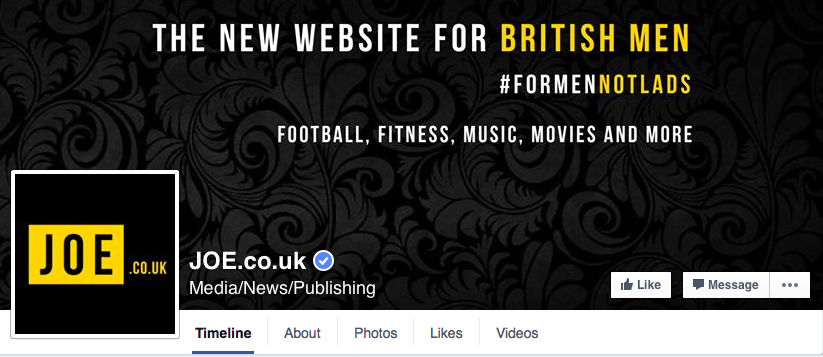Secure your place at the Digiday Publishing Summit in Vail, March 23-25

Lad-lite publication JOE Media thinks the male-interest sector is still underserved in the U.K., and it has a strong roadmap in place to serve that need, starting by doubling its U.K. team to 30 before the quarter is out.
With a tagline of “for men, not lads,” the 5-year-old digital publisher has its roots in Ireland and entered the U.K. last summer. It has since built its U.K. readership from zero to 2.5 million (still a long ways off from the U.K.’s most popular sports site, Sky Sports Media, with 10 million monthly uniques).
“We never spoke about women in an objectionable way; we never dallied in ‘lad’ culture or advocated the use of drugs or getting boozed up all the time,” said Niall McGarry, founder of Joe Media. “We targeted men interested in fashion, news, comedy and sport, who want to better themselves.”
JOE Media’s parent company Maximum Media has grown its profits for the last four years and plans to make £2 million turnover this year in the U.K. from branded content — a modest goal, said McGarry. It hopes to reach 15 million monthly uniques by the summer (it measures 6 million currently).

For men, not lads
In Ireland the site has targeted — wait for it — the average Joe, splitting the difference between the younger-skewing university-lad demographic and the more aspirational Daniel Craig style of GQ. A stronger legacy makes it easier to translate to U.K. shores. In addition to short, snappy and irreverent pieces, it covers longer-form content on more serious issues like men’s health and mental illness.
Of course, there’s the increased competition from sites like Lad Bible, which has strengthened its editorial product as its audiences grew and produced more serious news stories. But there’s some reputational damage here that McGarry suggests will be hard for brands and readers to forget.
“We never solicited a 17-year-old in Bolton to send in a selfie of her chest” (a now-defunct feature of Lad Bible’s Cleavage Thursday), said McGarry. In fact, when a reader sent in a dubious-looking video to JOE.co.uk, rather than publishing it, the editorial team wrote a story about why the content wasn’t fit to run.
Finding ‘mojos’ on Twitter
From the offset, hiring the right talent has been key in keeping the editorial integrity in line. Previous hires have included former Sky and Loaded execs.
To staff its U.K. posts, a first port of call is popular recruitment tool Twitter. “It’s is as good a CV as any,” said McGarry, who hired Nooruddean Choudry, a former university researcher, to create content covering football to politics on the strength of his Twitter output and following of 60,000 users.
Next, it’s on the lookout to staff posts including multimedia journalists, social media executives and video production specialists.
“We’re looking for ‘mojos,’ mobile journalists, people who write to a high standard and can shoot and edit their own mobile videos,” said McGarry. Currently, the video output is under 30 percent of the total content. In the next 12 months, McGarry wants this up to 50 percent.
Keeping editorial focus
This year, it will also add two extra sites, one focusing just on soccer and the other on health and fitness, choosing to split out in order to keep the focus for readers and advertisers, with each having its own group of journalists and dedicated social media teams.
“Facebook has become inundated with wacky videos, and none of it is focused,” said McGarry. “They have a lot of work to do there. It needs strong location-focused content; it has a duty of care to users.” Even so, McGarry knows the importance of being inside the Facebook circle rather than outside and is planning to spend around £500,000 with the platform in 2016.
“Six to 12 months is our real-term strategy, rather than our long-term strategy. The big commercial win for the next year is to have a dedicated branded content social video channel that will sit natively on Facebook. That’s a big change from two years ago.”
More in Media

Why more brands are rethinking influencer marketing with gamified micro-creator programs
Brands like Urban Outfitters and American Eagle are embracing a new, micro-creator-focused approach to influencer marketing. Why now?

WTF is pay per ‘demonstrated’ value in AI content licensing?
Publishers and tech companies are developing a “pay by demonstrated value” model in AI content licensing that ties compensation to usage.

The case for and against publisher content marketplaces
The debate isn’t whether publishers want marketplaces. It’s whether the economics support them.





